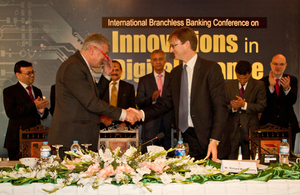DFID, Gates Foundation to set up digital financial services (DFS) unit
Department for International Development signed a Memorandum of Understanding with Gates Foundation to setup Digital Financial Services Unit in Pakistan

The UK Government’s Department for International Development (DFID) signed a Memorandum of Understanding (MoU) with the Bill and Melinda Gates Foundation to set up a Digital Financial Services (DFS) Unit in Pakistan on Monday. The MoU was signed at the International Branchless Banking Conference 2014 organised by the State Bank of Pakistan.
DFID and the Gates Foundation stressed their commitment to increasing access to affordable and safe digital financial services for excluded groups and small and medium enterprises in Pakistan. The Gates Foundation will provide $16m over the next three years for the DFS Unit.
The DFS Unit will be set up within Karandaaz Pakistan, a Special Purpose Vehicle (SPV) set up by DFID to strengthen the microfinance industry, entrepreneurship and small business development in Pakistan by working with existing institutions and through innovative financial products.
DFID’s support to Karandaaz will help create sustainable digital finance institutions in Pakistan focusing on improving access to finance for individuals and enterprises, job creation and raising incomes of the poor. It is a central pillar of DFID’s private sector development portfolio and signals a major shift to increase DFID’s support to economic growth in Pakistan.
The DFS Unit will aim to drive more payments onto digital platforms and encourage innovative uses for digital payments – both in the public and private sector. These initiatives will help 70% of Pakistan’s adult population, 60% of those earning less than $2 a day and half of the women residing in rural areas to have active digital accounts by 2024.
DFID will continue to support the growth of branchless banking and digital financial services to reach out to those segments of the population which were previously excluded from the network of financial service providers. The average size of branchless banking transactions is nearly Rs 4,000 (£24) which reflects that these services are being used by the poor.
Richard Montgomery, Head of DFID Pakistan, said
Enhancing digital financial inclusion will make it easier for individuals including women, young people and the poor to access formal financial services. It will allow for quick, secure and low-cost transactions between individuals and businesses, and be useful in the public and private sectors. DFID is delighted to be working in partnership with the Gates Foundation, given their expertise and international experience
The UK is committed to working with the government of Pakistan – at both the federal and provincial levels – to deliver on their ambitious plans to tackle poverty by creating more jobs, transforming education, increasing the tax base, stimulating growth, and providing better services to millions of children, women, and men across Pakistan.
Pakistan is now one of the UK’s largest recipients of development investment. As well as tackling the education emergency, other priorities for the UK include preventing thousands of women dying in childbirth by funding skilled midwives, nurses, or doctors for one million childbirths; providing job skills training to tens of thousands of the poorest people; and giving women in deprived households small monthly cash grants to purchase essentials, such as food and medicine.
Notes to editors
-
Across Pakistan, the UK is working closely with federal and provincial governments and partners on ambitious plans which will benefit millions of children and improve the standard of their education.
-
Pakistan is now one of the UK’s largest recipients of development investment.
-
As well as tackling the education emergency, other priorities for the UK in Pakistan include preventing thousands of women dying in childbirth by funding skilled midwives, nurses, or doctors; providing job skills training to tens of thousands of the poorest people; and giving women in deprived households small monthly cash grants to purchase essentials, such as food and medicine.
-
UK development investment is dependent on continuing to secure value for money and results.